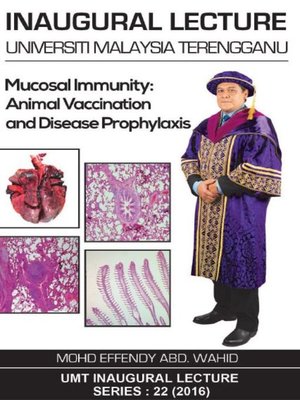Inaugural Lecture Prof. Effendy- Mucosal Immunity: Animal Vaccination and Disease Prophylaxis
ebook
By Mohd Effendy Abd. Wahid

Sign up to save your library
With an OverDrive account, you can save your favorite libraries for at-a-glance information about availability. Find out more about OverDrive accounts.
Find this title in Libby, the library reading app by OverDrive.



Search for a digital library with this title
Title found at these libraries:
| Loading... |
Animal protein is very important diet in human and animal. Although some people consume protein from plant, animal protein acquires different amino acids profiles that are readily and rapidly absorbed within the body. Thus the demand is still higher when compared to plant protein. However the supply of animal protein can be affected by lack of good farm practices and disease management. Disease control and prevention is very important in livestock husbandry. With the emergence of new pathogenic microorganisms, and increasing incidents of antibiotic resistance, vaccination is the best prophylactic measure to contain the infections. With the advancement of technology, different types of vaccines have been developed. Most of the vaccines available for livestock animals are delivered through parenteral route, which includes intramuscular, intradermal, subcutaneous or intravenous injection. The parenteral route will only induce systemic immune responses after the reentering of the same antigen species into the host's body. Most of these vaccines were designed for the regime of one dose of injection, without any guarantee of contact with the same antigen again. If the animals did not encounter the same antigen again, the level of antibodies will gradually subside due to the inability of the immune system to sustain sufficiently high antibody titers against the pathogen, which lead to the failure of the vaccination program. Part of the failures of systemic vaccination programs is due to the lack of understanding on the pathogenesis of the disease, which leads to inappropriate choice of site and route of administration of vaccine delivery.






